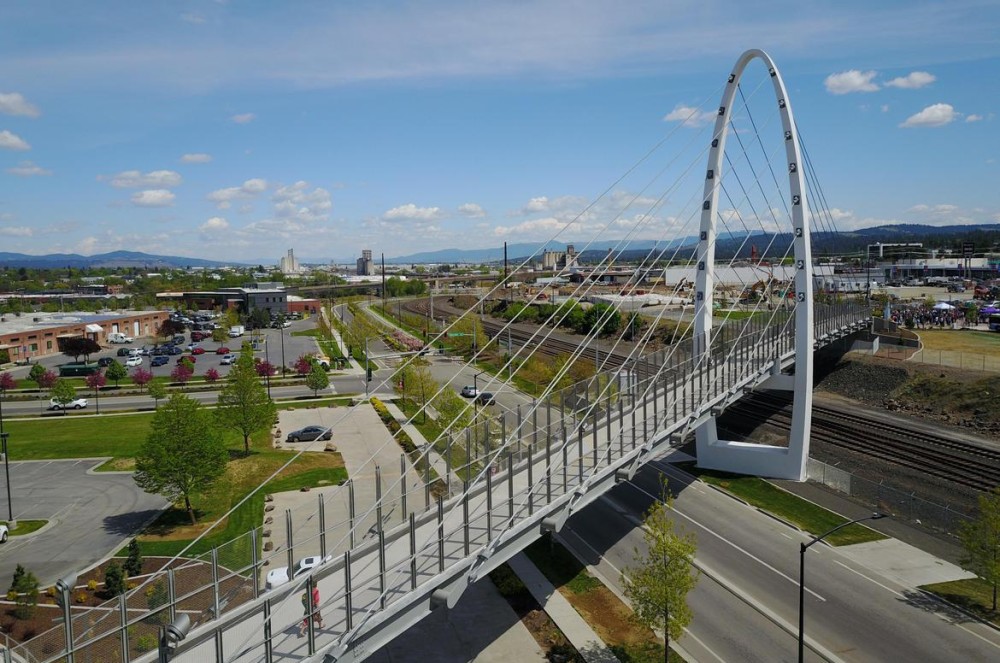Getting There: Bikeways are coming to East Sprague
Monday, July 29, 2019

(as reported in The Spokesman-Review)
By Nicholas Deshais nickd@spokesman.com(509) 459-5440
What started as an idea from a former Spokane City Council member, and turned into a war of words between the state Senate majority leader and the mayor, is inching toward reality.
East Sprague bikeways are coming.
Well before the University District Gateway Bridge was built, Councilman Jon Snyder proposed building a bike trail paralleling the railroad tracks and East Sprague Avenue. The multimodal Snyder had lots of ideas that remain just that, ideas – like the winding paved path through Edwidge Woldson Park to replace the 88-year-old Tiger Trail and his unlikely push to get a trail on the downtown railroad viaduct, from Maple Street to the University District.
But not this one.
Monday night, the Spokane City Council will consider approving a $90,000 study of a bicycle trail connecting the south landing of the University District Gateway Bridge with the Ben Burr Trail to the east. The study will look into various aspects of the trail, including whether or not it’s possible to build, but the city’s charge to Toole Design Group is “very open-ended,” said Spencer Gardner, a locally based transportation planner with Toole who will work on the project.
Toole, a national engineering and planning company specializing in bicycle and pedestrian projects, which will lead the study following council approval, will recommend an alignment for the trail and develop a conceptual design to help determine cost of construction.
Colin Quinn-Hurst, the city’s bicycle and pedestrian planner, said the study is expected to be complete by May 2020. Quinn-Hurst said challenges to build the trail in the area included the many different property owners, including BNSF Railways and Avista, and the difficult topography.
“There are so many questions about the proposed alignment,” Quinn-Hurst said. “The geology is tricky, with all those bluffs right there. There are a lot of challenges. The thought is we take it as far as we can.”
Toole’s Gardner said the off-street trail was the preferred outcome of the study. But if it proves too difficult to build, bike lanes could be built on streets paralleling East Sprague.
“We’ll first look if anything is feasible as an off-street path,” he said. “If we come to a point where that’s just not possible, we’ll look at other options. That only happens if the trail is just not possible.”
Years after Snyder proposed the trail, it was jump-started earlier this year when state Sen. Andy Billig, a Spokane Democrat and majority leader in the state’s upper house, demanded the city develop “an infrastructure plan to provide an east-west safe connection for the increased bike traffic volume on Sprague Avenue and identifying funding for these connection improvements.”
Billig said he’d withhold state funding for Spokane road projects until the city had a plan in place for the Sprague bikeways at the base of the University District bridge. Billig had helped secure $12 million in state funding for the $15.4 million pedestrian and bicycle bridge, and had pushed the city since June 2018 to include bikeways in its plans to rebuild East Sprague Avenue in the vicinity.
Though a conceptual bike trail paralleling the railroad tracks had been in the city’s Bike Master Plan since Snyder proposed the idea, it remained a distant idea. Instead, the city told Billig that bicycle traffic was envisioned “to parallel Sprague on Pacific and First avenues.”
When Billig’s plan to hold up state transportation funding to Spokane was approved by his Senate colleagues, Council President Ben Stuckart took the lead and wrote a letter to Billig saying the city would build an east-west trail near the south landing of the University District Gateway Bridge, install “shared bike route” signs on Sprague and add the trail project to the city’s six-year transportation construction plan. It was signed by Mayor David Condon and city council members, and Billig lifted the block.
During the same legislative session, state Rep. Marcus Riccelli, D-Spokane, set aside $3 million for the Sprague bike trail project, though funding may change depending how the study goes and as the city integrates the project into its short- and long-term construction plans.
The study is paid for with city funding. Four bids for the contract were submitted in early May, and Toole’s was chosen as the best by city staff, a decision that must be approved by council. Toole is behind some significant projects in Seattle, like the city’s first protected bike lane on Second Avenue, as well as the 27-mile Burke-Gilman Trail.
Snyder’s trail, however, would be Toole’s first project in Spokane.